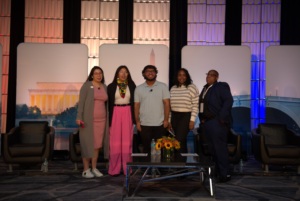Whatever Medicaid’s “new normal” looks like, it should always be informed by the people it serves
The Medicaid member is at the heart of the program and should inform its evolution.
Author
- Kate McEvoy
Project
I know that you, too, have had the experience of just one story being worth a thousand well-intentioned policy discussions. Let me share my most recent experience with this.
I had to go to an eye doctor this past week for an issue that, unsurprisingly but a bit depressingly, was diagnosed as “age-related” and without a medical remedy. After the ophthalmologist asked what I did and I told him about our work with Medicaid Directors, he asked me if he could share an anecdote. Past experience led me to believe that his story would focus on Medicaid rates or administrative processes, but all my instincts were wrong. It was something much more personal and human.
It turns out that his best friend had been diagnosed with a glioblastoma, through an amazing catch by a dentist who ordered imaging for an unrelated reason. While his friend’s brain tumor was successfully treated with surgery and he is alive and well three years later, he remains unable to work and as a result, needed health care for himself and his family. Health care that materialized in the form of Medicare disability coverage for him and Medicaid for his family -an unexpected but extremely positive experience for his friend, according to my eye doctor. But absolutely indicative of how valuable Medicaid is in so many different scenarios. And while it may be unanticipated, it is illustrative of just how often our friends, neighbors and family members need the program.
The reality of unforeseen circumstances was perhaps never so starkly evident as during the pandemic. As COVID-19 advanced across our country, Medicaid performed as it is designed to do by scaling up to address a bubble of demand caused by widespread unemployment, rapidly implemented federal pandemic authorities, pivoted to adopt new, flexible modalities including telehealth and grappled with the longstanding disparities that were illuminated and amplified by the pandemic.
Since the sunset of the public health emergency, all of us have been navigating a crucial bridging year in which programs are migrating from pandemic operations to the “new normal” for Medicaid. During this time, programs and their many partners have invested yeomanlike effort in the urgent, herculean work of unwinding – a dynamic and multi-faceted initiative from which we all continue to learn and improve. But over and above the intensity and necessary focus of that work, programs across the country have continued to be the seat of innovation in addressing needed systems improvements, health-related social needs, behavioral health integration, maternal health and supports for people in carceral settings.
As we continue to manage through the complex systemic challenges of unwinding three years of continuous coverage for more than 94 million Americans, it remains evident that Medicaid is at its finest when we see it through the lens of its impact on individuals and families. While that is powerfully illustrated by each and every story, I know that all of us are also interested in engendering as many opportunities as possible to hear directly from people served by the program, whether that be via formal Medical Care Advisory Committees, self-originating member initiatives, grassroots advocacy or structured research. Just one meaningful example of how this is happening nationwide is the joint Public Policy Lab/SCAN Foundation Public Prospective Longitudinal Understanding Study of 65+ adults, which is currently in progress. I have the honor of participating in an advisory body for this project, and we recently had a preview of video interviews with older adults from across the country – urban and rural; black, brown and white; gay and straight – speaking frankly and personally about their experience of health care; notably, with Medicare and Medicaid. I can’t wait for the public release of this enormously important body of work, which abundantly illustrates the unique value of individual lived experience and also the themes that can emerge in examining a large set of these interviews, nationwide.
We and our NAMD membership continue to be centrally focused on building in member viewpoints, advice and comment to the individual programs

and their strategic priorities. An important aspect of this is ensuring that the member voice is represented in our meetings. Cheers for all the insight that the young adult self-advocate members of the Young Invincibles (Martha Sanchez and Teran Carter of Ohio) and ND4Y Changemaker (Jazmine Wildcat of Wyoming, Manny Coleman of Maryland and Marco Lima of Rhode Island) brought to their self-moderated panel at our 2023 Fall Conference. At the core of what they told us:
- Medicaid is invaluable.
- Talk with, not at, the people who use the program.
- Ask, don’t tell, members what they need.
- Don’t generalize experience.
- Listen with care.
We also continue to have the privilege of showcasing members and self-advocates in our writing and podcasts. You can listen to Colorado Member Advisory Council leader Samantha Fields describe her advocacy on our podcast “How do members experience Medicaid?” Or read a little about what motivates disability advocate, Liz Weintraub in her work in the blog “Meet the advocate who has shaped Medicaid for people living with disabilities.”
While we all bridge from the current day to Medicaid’s next phase of growth and development, holding Medicaid members at the heart of those efforts remains our collective, forever work. Let’s all keep asking people served by our program what they think and experience. And listening carefully to what they – the true experts – have to offer.
Stay Informed
Drop us your email and we’ll keep you up-to-date on Medicaid issues.